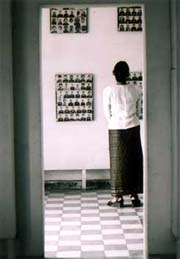
Photo
Copyright@ Valerie Ann Oliveiro |
But
what audience and using what form? Those questions impinge upon
the most basic assumptions about making a performance, the roles
of those who make it, and what it means to see it. At the festival
in New Haven, audience members were given a printed translation
of what was being said on stage. According to a program note, this
libretto was "in keeping with the documentary aspects of this
production," allowing "the audience the choice of focusing
on the performers and choosing to read the script at an appropriate
moment. Instead of chasing the surtitles, the audience member can
concentrate on the musicality of a different language, the atmosphere
around the performers and the shifts of emotions in their faces."
Providing the script was reasonable solution to a practical problem,
but it brings up troubling esthetic concerns immediately, automatically:
appreciating the musicality of the language somehow separately from
what is being said; savoring the shifting emotions of the performers
aside from the cause of those emotions; even viewing these participants
as performers at all. Thong Kim Ann’s young daughter died in
the labor camp because of the stress of life there. Here is the
rest of the story as told by her and reproduced in the script:
When my daughter died, my husband was 20 kilometers away working
in another labor camp. When he finally came back on home leave,
he was very shocked to hear about his daughter. He did not want
to live anymore. I wanted to go to ask the chief of my labor camp
to allow my husband to stay with me and to work in the corn fields.
My husband agreed to do so for me. I begged the chief to allow my
husband to stay. He said nothing for a long time, then he summoned
somebody. Suddenly two soldiers came and tied my husband’s
elbows behind his back. I cried, `I have made a big mistake by saying
this. I should be more faithful to the Aung Kah [Khmer Rouge]. Please
allow my husband to go back to where he was.’ They took my
husband away to prison. From that moment until now I have never
seen my husband again.
|
|


